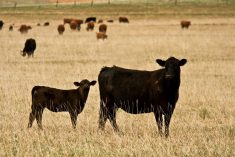For the week ending February 15, Western Canadian feeder cattle markets traded steady to five dollars higher on average compared to seven days earlier. The market has recovered after the recent stretch of adverse weather and the U.S. tariff threat in early February.
Alberta packers were buying fed cattle on at $276/cwt delivered, unchanged from last week. Southern Alberta break-even pen closeouts are around $265/cwt. Feeding margins are hovering around $120-$140/head which is the main factor supporting the feeder market at the current levels. Secondly, Ontario feedlot operators have been very aggressive despite adverse weather. Markets in Eastern Saskatchewan were premium to Alberta. The longitude line at Yorkton is the border for transportation efficiencies to Southern Ontario.
Read Also

U.S. grains: Soy futures post biggest monthly gain in nearly five years on China trade optimism
U.S. soybean futures climbed to a 15-month high and posted their biggest monthly gain in nearly five years on Friday following a rally fueled by the prospect of revived exports to China.
North of Saskatoon, larger-frame Simmental blended steers weighing 980 pounds carrying lighter butter on barley and silage ration with full processing records sold for $352.
At the Ste Rose Auction in Manitoba, medium to larger frame black heifers averaging 881 pounds reportedly moved at $330. North of Calgary, medium to larger frame tan mixed steers on backgrounding ration for controlled weight gain, averaging 850 pounds supposedly traded at $370. In the same region, similar quality heifers evaluated at 850 pounds were valued at $338.
At the Westlock Sale, a small package of mixed, medium frame steers weighing 755 pounds sold for $403. Southeast of Edmonton, black wide frame Limousin steers carrying medium to lighter flesh levels with a mean weight of 700 pounds were valued at $440. In the same region, red Simmental blended heifers averaging a shade over 700 pounds were last bid at $396.
In central Alberta, Simmental blended weaned steers averaging 640 pounds silenced the crowd at $475. In southwest Manitoba, black Angus light fleshed steers weighing a hair under 600 pounds notched the board at $480. Northwest of Winnipeg, a smaller package of Charolais heifers evaluated at 623 pounds traded for $418.
In central Alberta, mixed run-of-the-mill steers weighing 528 pounds traded for $542. South of Calgary, Gelbvieh mixed short-weaned steers averaging just over 500 pound pounds were valued at $550. In central Alberta, black Angus weaned heifers on hay diet with full processing records charted course at $459. At the Lloydminster sale, a small string of black steers weighing 473 pounds reached up to 569.
The view on U.S. tariffs and Canadian retaliatory measures are mixed amongst feedlot operators. Some Western Canadian cattle feeders are shipping cattle into U.S. custom feedlots due to the tariff uncertainty in early March. Some larger feedlot operators in Alberta are carrying on with business as normal with no fears.
The USDA increased their fourth quarter production estimate to 6.6 billion pounds, up from the January projection of 6.1 billion pounds. This was largely due to last week’s announcement for the U.S. to resume imports of Mexican feeder cattle. At this stage, the USDA appears to be counting on normal cattle trade between Canada and the U.S.
— Jerry Klassen is president and founder of Resilient Capital, specializing in proprietary commodity futures trading and market analysis. Jerry consults with feedlots on risk management and writes a weekly cattle market commentary. He can be reached at 204-504-8339 or via his website at ResilCapital.com.












